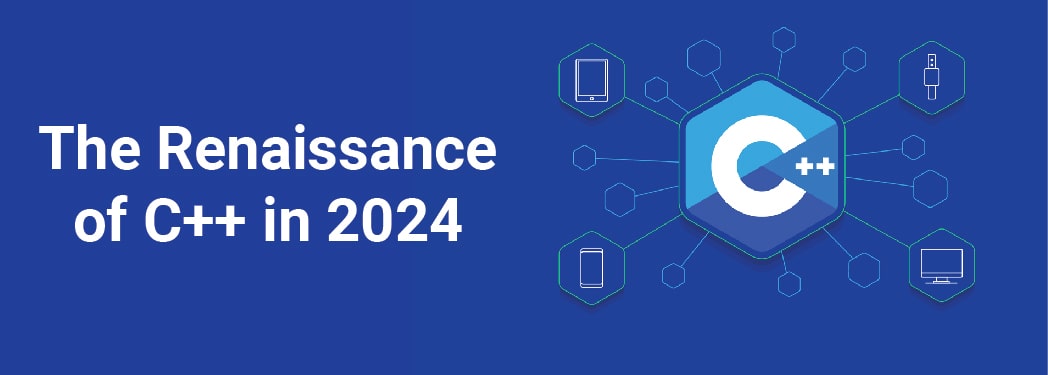The Renaissance of C++ in Modern Software Development: Applications in 2024

C++, with its decades-long lineage, stands as a testament to the enduring power of well-designed programming languages. Despite the emergence of numerous new languages, C++ has experienced a renaissance in modern software development, underlining its unmatched efficiency, performance, and flexibility. As we delve into the applications of C++ in 2024, it’s clear that this veteran language continues to play a crucial role in various cutting-edge domains, including system/software development, game development, and real-time simulation.
System and Software Development: The Foundation of Performance
In the domain of system and software development, C++’s performance-centric design makes it an irreplaceable choice for building operating systems, embedded systems, and performance-critical applications. Its direct access to hardware resources and system-level manipulation capabilities allow developers to optimize the efficiency and performance of their systems.
Operating Systems:
Many of today’s operating systems have critical components written in C++, leveraging its low-level operations and efficient memory management to ensure fast and reliable system performance.
Embedded Systems:
C++’s efficiency and its support for deterministic resource management make it ideal for embedded system development, where resources are often limited and performance is critical.
Game Development: Crafting Immersive Experiences
C++ reigns supreme in the realm of game development, primarily due to its performance optimization capabilities and control over system resources. The language’s ability to handle complex algorithms and graphics at high speeds makes it the backbone of many AAA game engines and titles.
AAA Games:
C++ is the language of choice for developing high-performance, graphics-intensive AAA games, offering the speed and flexibility needed to create detailed and immersive virtual worlds.
Real-Time Simulation: The Edge of Reality
In the sphere of real-time simulation, C++’s precision and performance are unparalleled. Whether it’s for aerospace, automotive, or simulations for scientific research, C++ enables the creation of highly detailed and accurate simulation models that operate in real-time.
Aerospace and Automotive:
For simulations that require real-time performance, such as flight simulators or automotive testing models, C++ provides the necessary computational efficiency and hardware control.
Scientific Research:
C++ is also extensively used in simulations for scientific research, including physics simulations and computational biology, where precision and performance are paramount.
Conclusion
The resurgence of C++ in modern software development is a testament to its enduring strength and relevance. Its unparalleled performance, control over system resources, and versatility make it the go-to language for developers across various domains seeking to push the limits of what’s possible. As we continue to explore the frontiers of technology in 2024, C++ remains at the forefront, powering the development of complex systems, groundbreaking games, and cutting-edge simulations. The renaissance of C++ is not just a revival but a reaffirmation of its foundational role in shaping the future of software development.
C++, with its decades-long lineage, stands as a testament to the enduring power of well-designed programming languages. Despite the emergence of numerous new languages, C++ has experienced a renaissance in modern software development, underlining its unmatched efficiency, performance, and flexibility. As we delve into the applications of C++ in 2024, it’s clear that this veteran language continues to play a crucial role in various cutting-edge domains, including system/software development, game development, and real-time simulation.
System and Software Development: The Foundation of Performance
In the domain of system and software development, C++’s performance-centric design makes it an irreplaceable choice for building operating systems, embedded systems, and performance-critical applications. Its direct access to hardware resources and system-level manipulation capabilities allow developers to optimize the efficiency and performance of their systems.
Operating Systems:
Many of today’s operating systems have critical components written in C++, leveraging its low-level operations and efficient memory management to ensure fast and reliable system performance.
Embedded Systems:
C++’s efficiency and its support for deterministic resource management make it ideal for embedded system development, where resources are often limited and performance is critical.
Game Development: Crafting Immersive Experiences
C++ reigns supreme in the realm of game development, primarily due to its performance optimization capabilities and control over system resources. The language’s ability to handle complex algorithms and graphics at high speeds makes it the backbone of many AAA game engines and titles.
AAA Games:
C++ is the language of choice for developing high-performance, graphics-intensive AAA games, offering the speed and flexibility needed to create detailed and immersive virtual worlds.
Real-Time Simulation: The Edge of Reality
In the sphere of real-time simulation, C++’s precision and performance are unparalleled. Whether it’s for aerospace, automotive, or simulations for scientific research, C++ enables the creation of highly detailed and accurate simulation models that operate in real-time.
Aerospace and Automotive:
For simulations that require real-time performance, such as flight simulators or automotive testing models, C++ provides the necessary computational efficiency and hardware control.
Scientific Research:
C++ is also extensively used in simulations for scientific research, including physics simulations and computational biology, where precision and performance are paramount.
Conclusion
The resurgence of C++ in modern software development is a testament to its enduring strength and relevance. Its unparalleled performance, control over system resources, and versatility make it the go-to language for developers across various domains seeking to push the limits of what’s possible. As we continue to explore the frontiers of technology in 2024, C++ remains at the forefront, powering the development of complex systems, groundbreaking games, and cutting-edge simulations. The renaissance of C++ is not just a revival but a reaffirmation of its foundational role in shaping the future of software development.




























